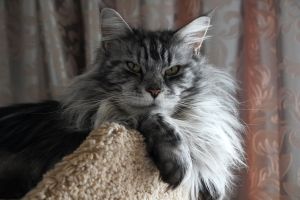Underneath your cat’s fluffy and adorable exterior, a mighty hunter lurks. As obligate carnivores, cats are born predators. For most indoor kitties, though, the closest they get to hunting is strolling to their food dish. Cats who cannot engage their natural instincts often become bored, and some develop behavioral issues, such as aggression.
As veterinarians, we strongly recommend keeping your cat indoors for their safety. That doesn’t mean you can’t indulge their predatory instincts, though. In this blog post, we will be discussing some of the many ways to fulfill your indoor cat’s desire to hunt without putting their health at risk or allowing them to harm your local wildlife. Let’s go!
Provide Views of the Great Outdoors
For some cats, keeping an eye on the outside world is almost as good as hunting. Simply setting up a spot where they can peer at birds and squirrels through a window might be enough.
Watch for signs of frustration, though. While many cats are perfectly happy chattering at wildlife they can’t get to; others could develop aggression due to their frustration. Keep an eye on your cat’s behavior to determine whether viewing the outdoors is a healthy outlet for them.
Let Them Explore the Outdoors Safely
An outdoor patio, or what's been aptly named the catio, is an excellent solution for keeping your cat (and the birds) safe while allowing them to venture outside. Setting up an enclosure with a fine mesh covering will enable them to enjoy the fresh air without the risk of getting lost or killing wildlife.
Another option is training your cat to wear a harness and walk on a leash. This works best with kittens and young cats, but some older cats can be trained, too. Once trained, you can take your cat on walks around the neighborhood. However, keep in mind that leashed cats must be supervised at all times and should never be left tied to a tree or post.

Provide Access to High Perches in Your Home
Even when they are not actively hunting, cats love looking over their surroundings from high perches. Maximizing the vertical space and providing access to high perches creates a sense of security and makes your cat feel like the king (or queen) of their domain. Giving your kitty a birds’ eye view helps satisfy their inner hunter.
Prioritize Interactive Play
Interactive play is vital for cats. In addition to keeping them active, it drives their predator instinct and fulfills their desire to hunt. When shopping for cat toys, the key is to look for interactive ones. Cats quickly become bored with toys that don’t move because they do not simulate prey.
Feather toys are favorites for most cats because they mimic the behavior and appearance of birds. Catnip mice are great, too, especially when attached to a string and pulled around the house for your cat to chase. Invest in several interactive toys, and change them out regularly to keep your cat engaged.
During playtime, be sure to let the kitty catch the toy once in a while. This will give them the thrill and satisfaction of a successful “kill.” Be sure to put away all toys with strings or ribbons after playtime. Cats are often tempted to swallow string-like items, which can cause an obstruction in their gut.
Keep Them Busy While You’re Away
When you can’t be home playing with your cat, leave out safe toys that encourage them to play. Puzzle toys and interactive feeders are great options. In addition to encouraging your cat to “hunt” for meals, these toys provide the satisfaction of a successful hunt in the form of food or a tasty treat.
Be mindful when choosing toys for your cat to enjoy while you are away. Make sure they are of high quality and don’t pose a choking or strangulation hazard.
Try a Laser Pointer
Laser pointers are great for interactive play. They engage cats’ hunting instincts and make it easy to play with your feline friend even when you’re exhausted after a long day at work. Always use lasers with caution, though, and do not shine them in your cat’s eyes as they can do serious damage.
To avoid frustration, end each laser play session by pointing the dot at prey your cat can “kill.” Something like a catnip kicker toy that they can really sink their claws into is a good option. The key is making sure there’s some reward to make your cat feel like the hunt was successful. If your cat seems overly frustrated because they cannot catch the laser dot, stick to playing with physical toys they can capture.
A cat’s predatory instincts don’t disappear just because they live indoors. By providing the proper stimulation and environmental enrichment, you can satisfy those instincts while keeping your cat (and your local wildlife) safe. In doing so, you can prevent boredom and frustration and keep behavioral issues at bay.
As your cat’s vet, we are here to help you give them the best life possible. Whether you need help with behavioral issues or advice on creating a more stimulating environment for your feline friend, we encourage you to reach out to us. Contact us today for the expert veterinary advice you need.

